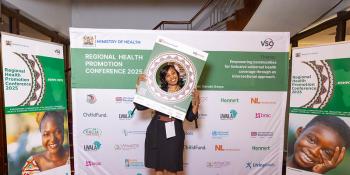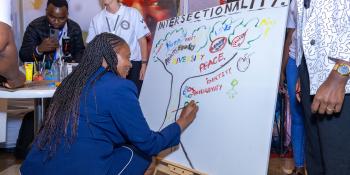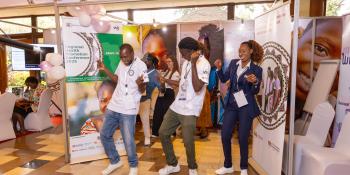When I told my husband, 'I’m not loved here. I’m just a maid to you,' he slapped me. I wished he would talk to and listen to me.Devna*Participant in VSO's One Community One Family project
In Nepal, suicide is the most common cause of death among young married women. Devna* shares her experience of a surviving a forced marriage, and how she and her family came to be involved in a project to reduce levels of violence in families in Baglung.
Each month in Nepal, it is estimated that 15-20 women end their own lives. The most unexpected and heartbreaking finding of a 2010 national study of maternal mortality is that suicide is the most common cause of death for women aged 15-49. The rate is much higher for women than men, in a reverse of the general global trend.
Why are so many younger women so deeply unhappy? The study cites “relationships and family issues” as important factors in suicides. These deaths could be seen as just the tip of an iceberg of disharmony in Nepali families, with young wives bearing the brunt.
A VSO project, which began in 2017, has been working to uncover the issues and develop solutions. Devna*, 24, who lives in Baglung, in the west of Nepal, is one of the 50 young wives who have taken part.
Warning: Devna’s story contains themes of domestic violence, which may be upsetting to some readers.
Married against your will
Like a great many Nepali women, Devna had little choice when it came to her marriage:
“I was 19 years old when I got married. It was a completely arranged marriage. I had never seen my husband before my wedding day.
“I argued with my mum and dad. I didn’t want to marry – I wanted to wait until after my education, after my grade 10 exam. But my grandfather forced through my marriage – when he speaks no one can argue with him.
“I felt like I was too young for my husband. I was afraid when he used to come closer to me. If he might do anything to me sexually, or approach me, I got very afraid. I used to cry a lot.”
Between the earth and the sky
Devna says that she found a huge difference – “as between the earth and the sky” – in her identity and way of life as she crossed the threshold from daughter to bride.
“Before, when something went wrong my parents always supported me and guided me in what to do. But it was exactly the opposite in my husband’s house. When I did something wrong I was so afraid and used to get sarcastic replies. My work was constantly criticised.”
Devna started each day as as a daughter-in-law at 4am with cleaning the floors by hand – not just her floors but those of her mother-in-law and sister-in-law. From thereon her day was filled with chores: washing utensils, preparing tea, fetching grass for the animals and wood for the fire before returning home to more housework. As her days passed in this way, she couldn’t help thinking back to how things used to be:
“As a daughter, I was living the life of a student. It was such a good life. But it was denied me.”
Migrating husbands, isolated wives
Baglung is a community of hillside farmsteads where young men are notable by their absence. The majority who can, leave to find work, whether in Kathmandu or in countries further afield – construction workers in Qatar, labourers in Saudi Arabia, factory workers in Malaysia. The area receives the second highest amount in remittances (money sent home by migrants) in Nepal, a statistic that points to the huge number of families with absent husbands.
Not surprisingly then, it wasn’t long before Devna’s husband left too, leaving her to answer to her critical mother-in-law, who seemed impossible to please and told her frequently that her son should have someone better. It hurt a lot.
“Even though I hadn’t wanted to get married, I had somehow started loving my husband. But two months after getting married, he went to Kathmandu to earn money, leaving me here with his family, who treated me very badly.
“When my husband came home to visit, he never spoke to me, he only spoke with his family. I remember once he beat me after one of our arguments. I told my husband, “I’m not loved here. I’m just a maid to you.” He slapped me. I wished he would talk to and listen to me.”
The weight of expectation
Devna was very unhappy in the family and began to dread what she knew would soon be expected of her: having a child.
“I arranged to have a contraceptive injection, secretly. But one aunt knew and she told my husband. After that, I had no choice but to stop and I became pregnant shortly after that.
“The only good thing was that after giving birth to my son was my husband visited more frequently. Besides that, everything was worse than before. I had to do everything without help – even while I still had stitches from where I had been torn during the birth.”
Increasingly isolated and trapped in her lowly role, in a family that acted as though they hated her, Devna was desperate. She even began to imagine her relatives were planning to kill her. She felt she couldn’t tell her parents without damaging their honour and reputation – and even if she wanted to, she had no way of contacting them.
“I had no money of my own. When I asked my husband for credit to charge my phone, he became suspicious and said ‘who do you need to call besides me?’ So I was trapped.”
New hope
It was around this time of deep unhappiness that Devna first heard from a neighbour that VSO was looking for families to take part in a new project called One Community, One Family. It would address family disharmony, while providing training and start-up kits for participant families to start small businesses.
Devna was initially sceptical about taking part – couldn’t she get in trouble and bring shame to her family if she shared how she really felt?
When she learnt that she’d be taking part in a group of 50 other young wives, in a confidential setting, her worries subsided a little and she agreed to take part:
“I felt a bit lighter than before. I felt, ‘Finally, there is someone here to listen to our problems, and our story’. I realised, ‘it’s not just me who faces violence, who has problems. There are lots of women who are also in my situation.’
Devna took part in 20 weeks of training with the other wives, which covered topics ranging from conflict resolution, to her legal rights, to nonviolent communication. The wives were given referral cards with the details of organisations that can step in if they face violence or abuse.
“I showed it to my husband. I told him about gender-based violence and my rights. He became scared by the stories of men who have been punished for mistreating their wives. Then he realised there is someone that cares about me, someone that will listen to me!”
I never tried to understand about my wife’s expectations before. I just saw what other men in this community do and followed that example. The training made me realise that my wife was hurting very badly.Sanani*Devna's husband
Starting a conversation in families
Naturally, older women in the community were initially suspicious – weren’t these young girls just gathering to bad-mouth them when they should be home working?
But they too were invited to take part in training, as were the men in the families.
The project was making sure the whole family took part, and in Devna’s household, things began to get a lot more peaceful. In her marriage, there was an improvement too.
The watershed moment came when Devna and the other wives performed a piece of drama for the whole community, including her husband. As she performed the role of an abused wife, the tears came to her easily, drawing as she was upon a deep seam of past hurt.
“Afterwards, for the first time ever he asked me: “Have I done such bad things to you?” I think it was then that he realised that he wasn’t being good to me and that he needed to change,” says Devna.
For her part, Devna felt herself becoming more confident. She knew her rights and how to speak to her mother-in-law and husband in a way that avoided tension and conflict. For the first time, she and her husband were communicating. He even agreed to support her with money to charge her phone.
“Things have improved between us. He visits us more often, and we are talking.”
*Names have been changed on the request of participants
Read more

In photos: Our Regional Health Promotion Conference 2025
Check out some of our favourite photos from Regional Health Promotion Conference (RHPC25). This event sought to reimagine Universal Health Coverage through the lens of intersectionality.

Using intersectionality to create healthy beginnings and hopeful futures
World Health Day brings global attention to the urgent need to end preventable maternal and newborn deaths. Learn more about how our Regional Health Promotion Conference is tackling these issues head on.

Highlights from the Regional Health Promotion Conference 2025
The Regional Health Promotion Conference 2025 reimagined Universal Health Coverage (UHC) through the lens of intersectionality, by bringing together experts from across East Africa and beyond.
